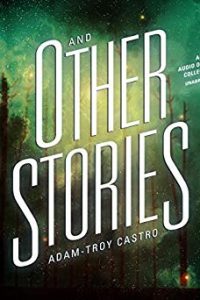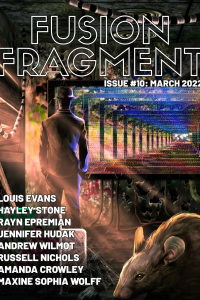Gary K. Wolfe Reviews The Gurkha and the Lord of Tuesday by Saad Z. Hossain
 The Gurkha and the Lord of Tuesday, Saad Z. Hossain (Tor.com 978-1-250-20911-5, $14.99, 176pp, tp) August 2019.
The Gurkha and the Lord of Tuesday, Saad Z. Hossain (Tor.com 978-1-250-20911-5, $14.99, 176pp, tp) August 2019.
Saad Z. Hossein’s pissed-off djinn, awakened after thousands of years by melting ice in the Himalayas (a nice, subtle reference to global warming), initially seems more concerned with his resumé than with vengeance: when he stumbles down the mountain and meets the crusty old Gurkha Bhan Gurung, he announces himself as “Melek Ahmar, the Grand Mark of the Tigris, Enlil of the Ziggurats, the Wrecker of Mountains, the Lord of Tuesday!” (It turns out that at some point in the past the seven most powerful djinns were each given a day of the week). The old Gurkha has a resumé of his own – a skilled soldier who years earlier had slaughtered nearly two dozen people in the home of a rich man, and who’s been hiding out ever since. The two of them head down to Kathmandu – and suddenly The Gurkha and the Lord of Tuesday takes a sharp turn from its remote fantasy landscape into the sort of hyper-urban SF that might have been dreamed up by Hannu Rajaniemi on a Nepalese vacation. Arriving in town like Butch and Sundance, they find themselves in a nano-drenched postapocalyptic urban infoscape, in which clouds of particles and body implants protect the citizens from a poisonous atmosphere, and which is managed entirely by an algorithm called Karma. Karma, we are assured, is not a self-aware AI; it doesn’t make governance decisions or even recommendations, but simply assigns or subtracts points from each citizen based on their actions and exchanges – a minutely quantified version of – well, karma.
At first “Kathmandu, Incorporated” seems to be a kind of post-scarcity utopia of the sort Frederik Pohl used to satirize. There is no economy, no currency (other than karma points), no crime, no disease, no private property, and no need for human labor of any sort. Melek and Burung, needless to say, are epic-scale disruptors in a couple of ways. For one thing, djinns can project a “distortion field” that interferes with Karma’s universal surveillance, and Burung has removed the implants which make him visible to the system. They also quickly create chaos by starting a massive bar fight and allying themselves with a rebellious punk djinn kid who calls herself KPopRetroGirl. All this draws the attention of a bureaucrat who sets out to investigate Burung’s original crime, all records of which seem to be lost, and to assess the threat to Karma’s delicate societal balance. As we might expect, this eventually leads to the discovery of cracks in the infallible system, dark secrets about Karma itself and its origins, and the potential for a messy, humanizing revolution. Hossein is a Bangladeshi author who has already established a formidable reputation for combining dark humor, loopy adventure, and breezy style with Escape from Baghdad and Djinn City. While those characteristics are much in evidence in The Gurkha and the Lord of Tuesday, he also shows a provocative knack for sharply satirical SF as well. It’s probably the funniest thing I’ve read this year.
Gary K. Wolfe is Emeritus Professor of Humanities at Roosevelt University and a reviewer for Locus magazine since 1991. His reviews have been collected in Soundings (BSFA Award 2006; Hugo nominee), Bearings (Hugo nominee 2011), and Sightings (2011), and his Evaporating Genres: Essays on Fantastic Literature (Wesleyan) received the Locus Award in 2012. Earlier books include The Known and the Unknown: The Iconography of Science Fiction (Eaton Award, 1981), Harlan Ellison: The Edge of Forever (with Ellen Weil, 2002), and David Lindsay (1982). For the Library of America, he edited American Science Fiction: Nine Classic Novels of the 1950s in 2012, with a similar set for the 1960s forthcoming. He has received the Pilgrim Award from the Science Fiction Research Association, the Distinguished Scholarship Award from the International Association for the Fantastic in the Arts, and a Special World Fantasy Award for criticism. His 24-lecture series How Great Science Fiction Works appeared from The Great Courses in 2016. He has received six Hugo nominations, two for his reviews collections and four for The Coode Street Podcast, which he has co-hosted with Jonathan Strahan for more than 300 episodes. He lives in Chicago.
This review and more like it in the August 2019 issue of Locus.
 While you are here, please take a moment to support Locus with a one-time or recurring donation. We rely on reader donations to keep the magazine and site going, and would like to keep the site paywall free, but WE NEED YOUR FINANCIAL SUPPORT to continue quality coverage of the science fiction and fantasy field.
While you are here, please take a moment to support Locus with a one-time or recurring donation. We rely on reader donations to keep the magazine and site going, and would like to keep the site paywall free, but WE NEED YOUR FINANCIAL SUPPORT to continue quality coverage of the science fiction and fantasy field.







